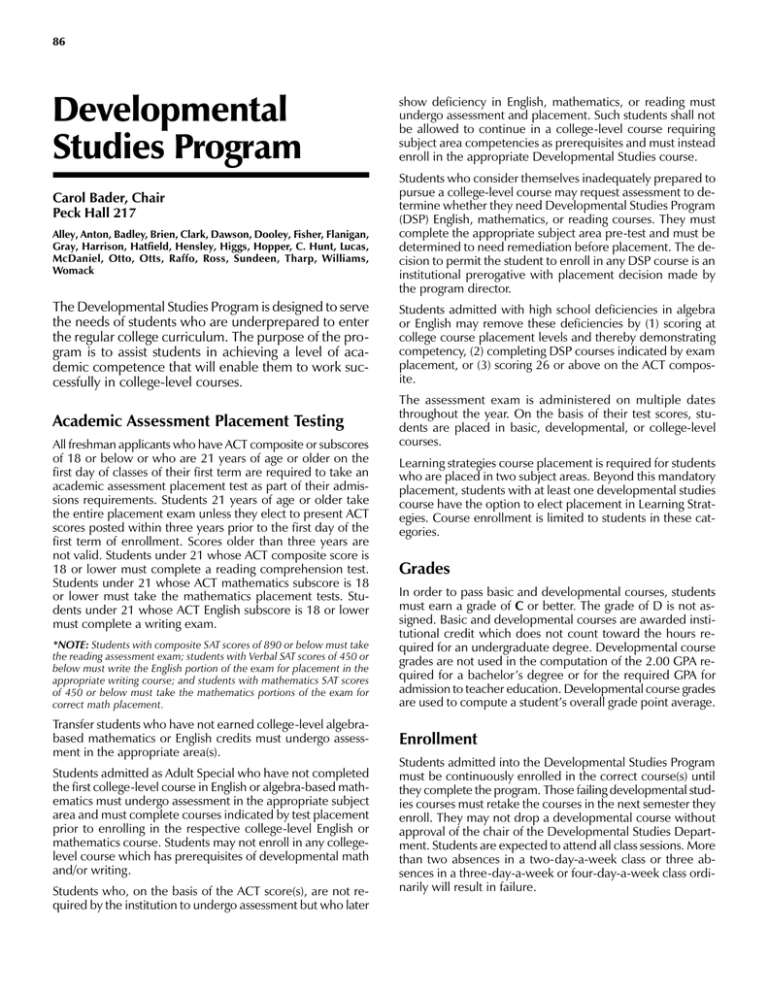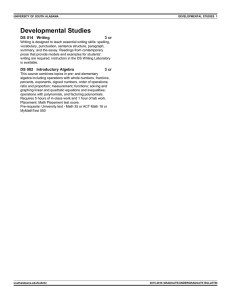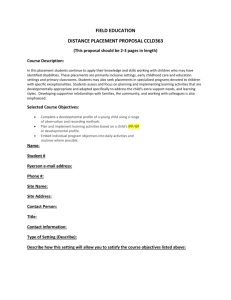Developmental
advertisement

86 Developmental Studies Developmental Studies Program Carol Bader, Chair Peck Hall 217 Alley, Anton, Badley, Brien, Clark, Dawson, Dooley, Fisher, Flanigan, Gray, Harrison, Hatfield, Hensley, Higgs, Hopper, C. Hunt, Lucas, McDaniel, Otto, Otts, Raffo, Ross, Sundeen, Tharp, Williams, Womack show deficiency in English, mathematics, or reading must undergo assessment and placement. Such students shall not be allowed to continue in a college-level course requiring subject area competencies as prerequisites and must instead enroll in the appropriate Developmental Studies course. Students who consider themselves inadequately prepared to pursue a college-level course may request assessment to determine whether they need Developmental Studies Program (DSP) English, mathematics, or reading courses. They must complete the appropriate subject area pre-test and must be determined to need remediation before placement. The decision to permit the student to enroll in any DSP course is an institutional prerogative with placement decision made by the program director. The Developmental Studies Program is designed to serve the needs of students who are underprepared to enter the regular college curriculum. The purpose of the program is to assist students in achieving a level of academic competence that will enable them to work successfully in college-level courses. Students admitted with high school deficiencies in algebra or English may remove these deficiencies by (1) scoring at college course placement levels and thereby demonstrating competency, (2) completing DSP courses indicated by exam placement, or (3) scoring 26 or above on the ACT composite. Academic Assessment Placement Testing The assessment exam is administered on multiple dates throughout the year. On the basis of their test scores, students are placed in basic, developmental, or college-level courses. All freshman applicants who have ACT composite or subscores of 18 or below or who are 21 years of age or older on the first day of classes of their first term are required to take an academic assessment placement test as part of their admissions requirements. Students 21 years of age or older take the entire placement exam unless they elect to present ACT scores posted within three years prior to the first day of the first term of enrollment. Scores older than three years are not valid. Students under 21 whose ACT composite score is 18 or lower must complete a reading comprehension test. Students under 21 whose ACT mathematics subscore is 18 or lower must take the mathematics placement tests. Students under 21 whose ACT English subscore is 18 or lower must complete a writing exam. *NOTE: Students with composite SAT scores of 890 or below must take the reading assessment exam; students with Verbal SAT scores of 450 or below must write the English portion of the exam for placement in the appropriate writing course; and students with mathematics SAT scores of 450 or below must take the mathematics portions of the exam for correct math placement. Transfer students who have not earned college-level algebrabased mathematics or English credits must undergo assessment in the appropriate area(s). Students admitted as Adult Special who have not completed the first college-level course in English or algebra-based mathematics must undergo assessment in the appropriate subject area and must complete courses indicated by test placement prior to enrolling in the respective college-level English or mathematics course. Students may not enroll in any collegelevel course which has prerequisites of developmental math and/or writing. Students who, on the basis of the ACT score(s), are not required by the institution to undergo assessment but who later Learning strategies course placement is required for students who are placed in two subject areas. Beyond this mandatory placement, students with at least one developmental studies course have the option to elect placement in Learning Strategies. Course enrollment is limited to students in these categories. Grades In order to pass basic and developmental courses, students must earn a grade of C or better. The grade of D is not assigned. Basic and developmental courses are awarded institutional credit which does not count toward the hours required for an undergraduate degree. Developmental course grades are not used in the computation of the 2.00 GPA required for a bachelors degree or for the required GPA for admission to teacher education. Developmental course grades are used to compute a students overall grade point average. Enrollment Students admitted into the Developmental Studies Program must be continuously enrolled in the correct course(s) until they complete the program. Those failing developmental studies courses must retake the courses in the next semester they enroll. They may not drop a developmental course without approval of the chair of the Developmental Studies Department. Students are expected to attend all class sessions. More than two absences in a two-day-a-week class or three absences in a three-day-a-week or four-day-a-week class ordinarily will result in failure. Developmental Studies 87 Students placed in four basic and/or developmental classes per semester may take only one other courseeither an ROTC or PHED activity course. They may not take any college-level course which requires skill in any area in which they show a deficiency as determined by the placement test. Students are urged to consult with one of the Developmental Studies advisors for details. Support Services A number of support services provide tutoring to assist students in achieving the objectives of their courses. These are (1) the Developmental Writing Lab, (2) the Developmental Reading Lab, and (3) the Developmental Mathematics Lab. Students in most basic courses are required to enroll in the tutorial programs offered in these labs, while students in developmental courses are normally enrolled in tutoring at the recommendation of their instructors. The tutoring provided in the labs reinforces the curriculum and the objectives of the basic and developmental courses. Each student in Developmental Studies is assigned an advisor who assists with scheduling developmental classes and academic advising. Students should check with the Developmental Studies Advisor Office in 102 Peck Hall (615-8982339) immediately upon arrival on campus to determine the name and office number of the assigned advisor. Students should make an appointment to meet with their advisors prior to registration. Students should see their advisors at least twice during the semester. Students on probation must see their advisors at least four times a semester or once a month. Program: Basic and Developmental The Developmental Studies Program offers courses in both basic and/or developmental studies in four areas: writing skills, reading skills, mathematics skills, and learning strategies. Course offerings in basic and developmental studies are listed each semester in the class schedule book and carry the designations of either DSPW, DSPM, DSPR, or DSPS. In addition to the usual daytime offerings, basic and developmental courses are offered at night and during the summer. More detailed specifications for the Developmental Studies Program may be found in the Tennessee Board of Regents Guideline No. A-100. Courses in Basic Studies DSPW 0700 (RSE 070) Basic Writing. Three credits. Prerequisite: Placement pretesting. Intensive practice in paragraph and sentence construction; intensive review of basics of spelling, grammar, and punctuation. Enrollment in the Writing Center required. DSPM 0700 (RSM 070) Basic Mathematics. Three credits. Prerequisite: Placement pretesting. Intensive study of all arithmetic operations with whole numbers, decimals and fractions, percent and equivalency, units of measure, word problems, geometry, graphs, elementary probability, and statistics. DSPR 0700 (RSR 070) Basic Reading. Three credits. Prerequisite: Placement pretesting. Intensive practice in reading comprehension to improve basic reading skills through classroom instruction and self-paced activities. Courses in Developmental Studies DSPW 0800 (DSE 080) Developmental Writing. Three credits. Prerequisite: Placement pretesting. Intensive practice in writing brief essays for a variety of rhetorical purposes and audiences. Emphasis on strategies for prewriting, writing, and rewriting. Also intensive review of sentence and paragraph construction, and basic language arts. DSPM 0800 (DSM 080) Elementary Algebra. Three credits. Prerequisite: Placement pretesting. Intensive study of numbers and sets; algebraic expressions; solution of linear equations; rational expressions. DSPM 0850 (DSM 085) Intermediate Algebra. Three credits. Prerequisite: Placement pretesting. An intensive study of algebraic fractions, first-degree equations and inequalities, exponents, roots and radicals, second-degree equations and inequalities, function, relations, and graphs. DSPR 0800 (DSR 080) Developmental Reading. Three credits. Prerequisite: Placement pretesting. Intensive practice in reading comprehension to develop inferential and critical reading skills, vocabulary, and an efficient rate of reading. DSPS 0800 (DSS 080) Learning Strategies. Three credits. Intensive study and practice of effective note-taking, test-taking and study techniques, the use of library resources, and critical thinking. MATH 0990 (DSM 090) Basic Geometry. Three credits. Plane and solid geometry including measurement formulas, properties of plane figures, proof techniques, symmetry, congruency, and construction. Open only to those lacking required high school geometry course for unconditional admission to University. Courses in Academic Success Program [ACA] ACA 0100 (ACA 010) Academic Recovery. One credit. Intensive study and practice in academic and personal skills that characterize academically successful students. Open only to students who have been readmitted after being academically suspended from the University. ACA 3000 (ACA 300) Theory and Practice of College Peer Tutoring. One credit. Prerequisite: Consent of department. Provides training in the knowledge and fundamental skills useful to tutors in various academic disciplines. Pass/Fail.




